Episodes
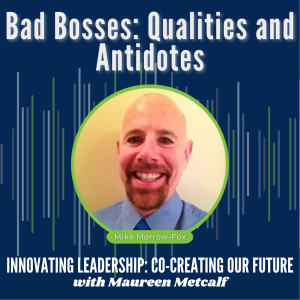
Wednesday Mar 15, 2023
Wednesday Mar 15, 2023
Guest: Mike Morrow-Fox
We have all had a bad boss or someone we struggled to work with. During this show, Maureen and Mike will compare and contrast good bosses and bad bosses. Mike draws heavily on his research as well as decades of successful leadership experience to lay out a list of bad behaviors, the correlating great behaviors and discuss how to move from bad to great. They will provide examples to illustrate both bad and good. This show will be enlightening and enjoyable.
Bad Bosses - Are You One?
Mike Morrow-Fox and Maureen co-write this blog post as a companion to the podcast recording on Bad Bosses.
Bill comes into the office. He is swamped by the work he must accomplish – preparing for a high-visibility client meeting, meeting with his executive leadership, and consolidating information to create his monthly reports. On top of this, he has seven highly competent direct reports. He’s grateful that his team is so effective because he doesn’t need much time with them. He really likes his team and wishes to do more mentoring, but for now, he needs to keep his head down and finish his work. As we read in the article, his approach is ineffective because he is not actively engaging them.
In a January 2016 article published in the Gallup Business Journal, ‘Gallup has been tracking employee engagement in the U.S. since 2000. Though slight ebbs and flows have occurred, less than one-third of U.S. employees have been engaged in their jobs and workplaces during these 15 years. According to Gallup Daily tracking, 32% of employees in the U.S. are engaged -- meaning they are involved in, enthusiastic about, and committed to their work and workplace. Worldwide, only 13% of employees working for an organization are engaged.’
Bosses play a major role in employee engagement and disengagement. Engaged bosses drive engagement, while disengaged bosses drive disengagement and, even, active disruption.
Let’s start with a definition. What is the difference between a leader and a boss? Leaders set the cultural tone and strategic vision; bosses are the employee’s conduit to the larger organization.
We understand that there are some obvious characteristics that would make anyone a bad boss, like throwing temper tantrums and micromanaging. We’re going to talk about subtler differences.
Bad Bosses
Great Bosses
Let employees “do their thing”
Develop their employees, including discussions on strength-based leadership data
Protect their departments
Facilitate cross-organizational collaboration
Are customer-focused at the expense of other needs
Are priority-focused, helping employees self-manage competing priorities
Are busy with day-to-day operations
Are busy with continuous improvement
Recognize their employees to reward them for completing an assignment
Recognize their employees as a regular part of development and connection with the mission
Put on a good game face
Are authentic and compassionate: “Someone at work cares about me.”
Tell their employees “how.”
Tell their employees “why.”
‘If your manager ignores you, there is a 40% chance that you will be actively disengaged or filled with hostility about your job. If your manager is at least paying attention, the chances of you being actively disengaged go down to 22%. But if your manager primarily focuses on your strengths, the chance of your being actively disengaged is just 1% or 1 in 100.’
The number one action great bosses take is regularly taking time to engage with their employees and focusing on employee strengths during these interactions. Great bosses also have regular conversations about employee development, again focusing on employee strengths more than deficiencies. Going back to Bill in the opening story, he would likely have dramatically improved their engagement if he had allocated time each week to talk to employees, discuss their projects, and build on their strengths to help them continue to thrive. It seems rather easy, yet it is not common.
Most of us have had bad boss experiences and found a way to cope until we changed jobs or the bad boss rotated out. The question we pose is, what cost do you incur if you happen to be less involved than your employees need you to be, or if you are primarily focused on correcting and giving guidance rather than balancing guidance to improve performance with helping employees improve their strengths?
References:
Rath,T.,& Harter, J. (2010, July). Composite of several submissions. Servant Leadership Focus Newsletter, Volume 4, Issue 7.
Mann, Annamarie, and Harter, Jim. (2016, January). Gallup.com Business Journal.
Photo credits: www.flickr.com creative commons Arpit Gupta
About the authors:
Maureen Metcalf is the Founder and CEO of Metcalf & Associates. She is an executive advisor, a speaker, coach, and the author of an award-winning book series focused on innovating how you lead. She is also on the faculty of universities in the US and Germany.
Mike Morrow-Fox, MBA, has over 20 years of experience in leading technology and human resources operations for health care, education, banking, and nonprofit organizations, as well as several years of university teaching. His bachelor’s degree focused on Industrial Psychology and Employee Counseling and his MBA focus was on Organizational Leadership. He is currently completing his Doctorate in Educational Leadership. He is a contributor and thought partner for several of the innovative leadership books.

Wednesday Mar 15, 2023
Wednesday Mar 15, 2023
Guest: Lesley Southwick-Trask
This is a witty and delightful conversation where Lesley shares her genuine experience launching and growing companies and explore what unique qualities she used as a leader to be named one of the top 100 most powerful women in Canada. She shares what she has learned from her unique background and shares her perspective on what she would recommend for other leaders.Lesley is open and genuine in sharing her personal journey as an anthropologist from her first job as an on-air radio manager to a highly influential leader and entrepreneur to hosting guests along the Camino in Portugal.She will answer questions about her unique journey and also discuss her recommendations for leaders now.Lesley also hosts a radio show Women who Lead. She will share some of her learnings from the highly influential women she has interviewed.
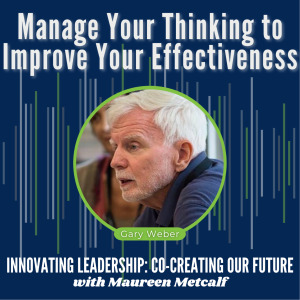
Wednesday Mar 15, 2023
Wednesday Mar 15, 2023
Guest: Gary Weber
Gary Weber and Maureen Metcalf talk about recent brain research and how leaders and emerging leaders can leverage this information to gain additional capacities. They also discuss what recent research is DISPROVING, busting conventional wisdom.
Gary’s work is perfectly tailored to help leaders rethink how they lead, and as we look at the brain consciousness connection, what it means to be a leader. Gary also connects his work with the brain to promoting happiness.
Questions covered:
1) Why did you take up this work?
2) What question did you start with?
3) Tell us about your research at Yale.
4) How can we become much more productive and less distracted?
5) How do I stop the internal narrative in my head?
6) How does being less distracted and managing my internal narrative help me be more happy?
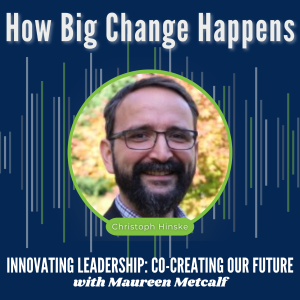
Wednesday Mar 15, 2023
Wednesday Mar 15, 2023
Guest: Christoph Hinske
Christoph Hinske gave a keynote speech to the World Green Building Council in Venice, which focused on retrofitting all buildings in Europe. The gathering was part of the EU-funded BUILD UPON project, the world’s largest collaborative effort on building renovation — bringing together over 1,000 organizations across 13 countries, at over 80 events in 2016-17.
As leaders focusing on implementing multiple concurrent changes, it is imperative that we understand what drives change and what inhibits it or just drains our energy. He discusses:
1. The World GBC project.
2. How work with agreements increases the probability of successful transformation.
3. What an agreements map and cost of scarcity calculation is.
4. How mapping and calculating the cost of agreements drives change.
5. Concrete steps you can take to evaluate your agreements.
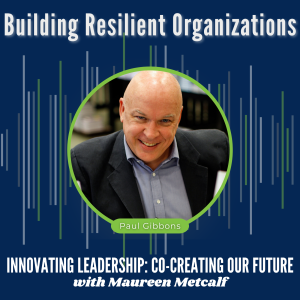
Wednesday Mar 15, 2023
Wednesday Mar 15, 2023
Guest: Paul Gibbons
Paul Gibbons talks about his new book (continuation of an earlier interview) focused on large scale change and the concepts of agility and anti-fragile. These are foundational concepts for leaders looking to build organizations that are able to respond quickly to predicted and unpredicted change. Being agile and ‘anti-fragile’ positions organizations to be resilient to the shocks they will face and enable them to be proactive – leveraging the shocks that adversely impact other organizations. Paul and Maureen will discuss: 1) What is anti-fragility? 2) What are some real-world examples of anti-fragility? 3) Why should this be of interest to business leaders? 4) Do we know of business organizations that are anti-fragile? 5) How might a leader use these principles? 6) How can a leader use these principles to position the organization to proactively respond to threats?
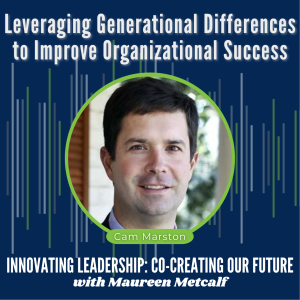
Wednesday Mar 15, 2023
Wednesday Mar 15, 2023
Guest: Cam Marston
Cam and Maureen will talk about different generational groups and pros and cons to working with each. When armed with this foundational knowledge, leaders and businesses can adapt to get the greatest value from their workforce and provide the best possible working experience to each group.Questions they will address include:
1) Where do these generational definitions come from? How about the ages?2) How different is each, really?3) What do they have in common?4) Can you give me some strengths and weaknesses in leadership for each generation?5) How about as followers, what do they do well and poorly?6) What are each of their futures? Where will they end up?
Marston’s expertise has also been featured in the Wall Street Journal, The Economist, the Chicago Tribune, BusinessWeek, Fortune, Money, and Forbes, as well as on Good Morning America, CNN International, and the BBC. He writes a column for InvestmentNews, CNBC, and Investment Advisor among others.
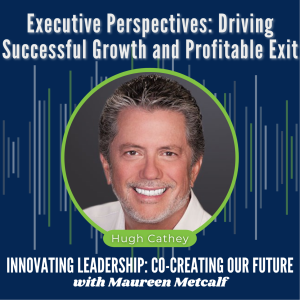
Wednesday Mar 15, 2023
Wednesday Mar 15, 2023
Guest: Hugh Cathey
Hugh and Maureen will talk about how he developed his unique leadership niche as well as what he does to scale companies and prepare them for a profitable exit.
Questions: 1. What was the most formative position you have held?2. What are the primary factors you consider when working with a client?3. How important is leadership in scaling a company?4. How do you define effective leadership?5. How did you build your leadership?6. What do you consider when taking a client?7. What causes you to turn down clients?8. What do you do that sets you apart from other leaders and growth consultants?This is a generative and open conversation with a highly effective CEO, board leader and consultant. Hugh talks about how he developed personally and who influenced his success as well as how he selects leaders to drive the ventures he supports.

Wednesday Mar 15, 2023
Wednesday Mar 15, 2023
Guest: Sherry Peck
Sherry and Maureen will talk about how careers evolve. Most of the leaders I have coached or worked with, when they look back at their careers, indicate that they didn't imagine being where they are or that the short term decisions would turn out the way they did.Sherry will discuss interviews she has conducted with a range of women and also ask Maureen to share more about her career progression. We invite you as our listeners to reflect on the these questions for yourself and chart your own history.
1. What key career moves have you made and what prompted them?2. How did you get to your current role? Did that role even exist when you started college?3. How did early influences get you where you are now?4. How do you learn and what inspires you now?5. From a foundation of success - what is next for you? Are you focused on legacy? If so, what is that legacy?
As we share our stories, I invite listeners to think about the legacies they leave and how to make the greatest impact.

Wednesday Mar 15, 2023
Wednesday Mar 15, 2023
Guest: Patrick Rettig
For over 25 years Patrick has successfully saved many companies from bankruptcy. He is passionate about American entrepreneurs - the companies $20 million nder, which are the backbone of America.In this show, Patrick will talk about what he has learned from his own personal struggles and the work he does with entrepreneurs.
1. Why does he do this work?2. What is a successful entrepreneurial CEO to him?3. What kind of people survive reorganization?4. Is it possible to fail more than once and recover?5. Can you teach people to avoid their own shortcomings or are we all programmed to fail in certain areas?6. What is the difference in unfair and unrealistic expectations?Patrick is highly energetic. He followed an unconventional path to his current role. His personal stories make his message highly compelling.
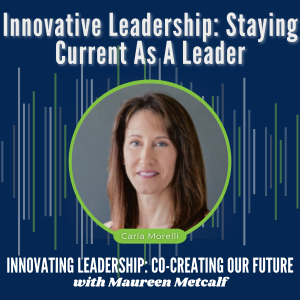
Wednesday Mar 15, 2023
Wednesday Mar 15, 2023
Guest: Carla Morelli
Today's successful executives need to optimize their performance at individual and organizational within complex business environments. They need to innovate the way they lead at the same pace as they innovate their products, services, and processes to ensure they receive the value they expected for their investment in change. This session is based on the Innovative Leadership Fieldbook – winner of the 2012 International Book Award – Best Business Reference Book.During this session we will:• Introduce the innovative leadership model• Discuss each of the five elements
This model will help leaders focused on improving their leadership skills as well as those participants who want to improve the leadership skills of others in their organization.
